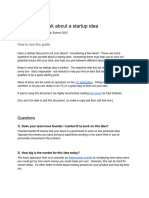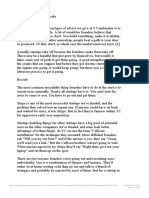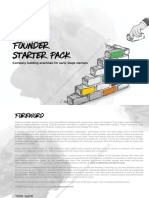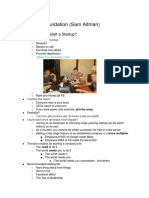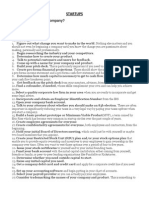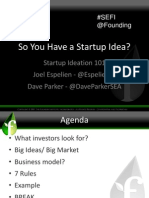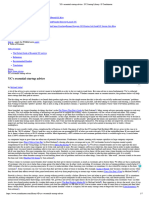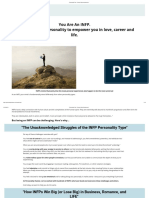## Four areas of success in a startup
- An idea
- A Product
- A Team
- Execution
# Idea
It is now a days a common practice to say idea doesn’t matter, but the truth is,
idea does matter. A great execution to a terrible idea will get you nowhere. All
great companies started with a great idea, not a pivot. All the great ideas of the
companies are pivoted into something that the founders wanted. For example, Airbnb
happened because Brian could not pay his rent but had plenty of space in his
apartment
<aside>
💡
The definition of an idea includes the size and the growth of the market, the
growth strategy of the company, the defensibility strategy and so on. When
evaluating the idea, think of all these things. Not just the product.
</aside>
Planning is very important in the startup. This is the part missing in majority of
the startups today. Long term thinking is very advantageous, especially in
startups, since a great idea requires at least a decade for execution.
### Most important part of a good idea
<aside>
💡
To build a business that is difficult to replicate. You want an idea that turns
into a monopoly.
</aside>
The idea comes first, and the startup comes second. Wait to start a startup until
you come up with an idea you’re compelled to explore. This is also true when you’ve
to choose between different ideas. If you’ve several ideas that all seem pretty
good, work on the one which you think about the most when you’re not working
Best companies are always mission oriented. It is often difficult for a large group
of people to work with extreme focus unless they feel working towards an important
mission, which is usually hard to get without a great founding idea.
<aside>
💡
The company should feel like an important mission, not just to founder, but to each
and every one of the employees
</aside>
Example: When Scott visited Veersa office, the first thing he told to the
developers was that the mission was saving lives. What he said was *“You’re saving
lives by creating this application.”.* Hence, the mission is to save lives.
�Another advantage of mission-oriented company is that people outside the company
are more willing to help you, which makes working on a hard idea easier than
working on an easy idea.
### You want an idea that turns into monopoly
Generally, ideas at first do not seem very good. You want an idea that turns into
monopoly. Having monopoly in a huge market right away is really very hard. You need
to find a small market, have monopoly and then quickly expand from there
This is the reason some great startup ideas look really bad in the beginning. The
mindset should be *“Today, I want a small subset of the users to use my product,
but I want all of them and in the future almost everyone will use my product.”*

<aside>
💡
Truly good ideas do not sound like they’re worth stealing. Hence, don’t be afraid
to share your ideas. You must sound like *“Here’s an idea, which might sound bad.
But here’s why it is a great idea”*
</aside>
The first version of your idea need not sound really big, but it needs to take over
a specific set of market and expand from there. You need to also predict how the
market evolves. You need to find a market that will be big in 10 years. You also
need to predict how the market will evolve, how will it look like in the next 10
years
<aside>
💡
Target a small but rapidly growing market rather than a large but slow growing
market since the consumers in this market are desperate and wil happily accept
imperfect but rapidly improving product.
</aside>
<aside>
💡
Choose market very wisely. You cannot create a market that does not want to exist.
You can change everything in a startup except the market. Think about the market
first. Build a product that market needs not a market that the product needs
</aside>
### Why now?
If you don’t have an answer to this question, you should be somewhat suspicious
about it. You need to build something that you yourself need, it’d be a lot easier
to understand as compared to when a consumer explains it.
If you’re building something that someone else needs, you’re at a big disadvantage.
In that case, try working as close with consumer as possible, by working with them
�in their offices or talk to them multiple times a day. One thing about good startup
ideas is they’re very easy to explain and can be explained in a single line.
# Product
Product includes customer support and copyright explaining it
Anything that involves customer interaction with what you built for them.
In order to build a great company, you need to have a great idea. This great idea,
then must translate to a great product. This great product then should be converted
into a great company. One of the most important job of the founder is to make sure
that the company builds a great product. Until you make a great product, nothing
else matters.
In the initial days of all the great companies, the focus should be on making a
great product sitting in front of a computer or interacting with customers. Make
something that the users love

<aside>
💡
Make something that people love. Making something that people love but in a medium
amount is a great way of failing without ever knowing the reason of fair. Make sure
whatever you make is loved extremely by the people using it
</aside>
It is always better to make something that a small number of users love than a
large number of users like, When deciding to building a product, you can make
1. Either something that a lot of people like, or
2. Something that a small amount of people love
It is much easier to expand from something that a small number of users love to
something that a lot of users love. If you get this right, you can get a lot of
other things wrong and still succeed, but you cannot afford to get this wrong. One
indication of this working well is that you’ll observe organic growth - growth by
word of mouth. If you don’t see organic growth and believe some big partnership
will come and save you, that’s a sign of big trouble
<aside>
💡
If you do not get organic growth - growth by word of mouth, social media and
marketing is of no use. What this means is, you need to still improve your product.
</aside>
Don’t be scared of your competitor getting capital, even they don’t know what
they’re doing. Most of the startups fail not because of competition, but because
they fail to make something that users love.
<aside>
💡
In order to make something that users love, start with a simple product. Even if
�your eventual plans are super complex, always start with the smallest subset of
problem. Whatever you think is the smallest. It’s hard to build a great product, so
start with the smallest surface area possible
</aside>
The first version of Facebook was comically simple, the first version of Google was
just a textbox and 2 buttons, which gave really good search results
Another reason simple is good is because it lets you do one thing extremely well,
Be fanatic about the product. If founders ship a bad product, they must fix the
product very very quickly. You need some level of fanaticism to build a great
product
### Feedback Cycle
You need some users to help with the feedback cycles. The best and the only way to
get these users is manually. You should recruit them by hand. Running Google ads to
acquire users in the early stages is redundant. You only need a few users and
interact with them each and every day. *Ben Silvermen, the founder of Pinterest
recruited the initial users by chatting up with strangers in the coffee shop and
set up the browsers to the Pinterest home page before he was kicked out by the
employees*
<aside>
💡
The aim is to get a small group of users for feedback cycle and this small group of
people must love your product. Understand that group extremely well, get extremely
close to them and listen to them. You’ll always find out they’re willing to give
you feedback
</aside>
Even if you’re making a product for yourself, always listen to the outside users
and they’ll guide you to make a product they’re willing to pay for. Do whatever you
can to make them love you since they can also be the advocates that help you get
more users

The idea is to build an engine in the company that accepts feedback from the users
and converts them into product decisions, then get it back in front of users and
repeat. Ask them what they like and what they don’t like and watch them use it.
Make this feedback loop as tight as possible. Even if your product gets 10% better
every week, that’s exponential growth in long term.
<aside>
💡
The best part of founding a software company is how fast can this feedback loop be.
Cycle can be completed in hours. You should keep this going throughout the entire
company’s life, but this is really important in company's early days
</aside>
Great founders do not put anyone between themselves and their customers. They
themselves manage sales and customer support in the early days. It is critical to
�get this loop embedded in the culture. Do not hire sales and customer support
representative in the early days (Don’t even use chatbots).







